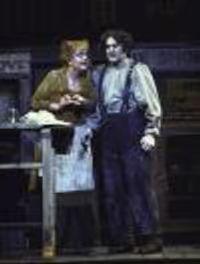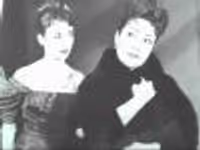Changes to CAMELOT
#50LA Times Review
Posted: 1/15/07 at 11:52am
First, to answer the question from Eric, the cuts were instituted approximately three months into the original run.
Also, dblenn, after the cuts were put in, the show ran two hours and 35 minutes, not including intermission. So the show probably ran 2 hours and 45 minutes at its Broadway opening, plus intermission. It was at its out of town opening in Toronto that it ran four hours plus.
"To me. Clearly not to you. But put your dictionary aside for a moment and think logically about this: do you really believe that I am to accept that Arthur could do all this in a matter of a few years? (Oh, sorry, four or five.) England was a hopelessly splintered country, with fiefdoms all over the place. Some guys come along and says, 'Hey, let's all get together and, by the way, I'm king' and everyone nods their heads in agreement and we move on to how happy everyone was with the Round Table and a unified England?"
Thanks for the suggestion that I should think logically about this. Without your having made that suggestion, it would never have occurred to me that I should logically.
So now I'll make a change and try to think logically.
Logic seems to suggest that words have defined meanings. That's why we call them definitions. And dictionaries are there to help codify what words mean. Because if we all choose to give words whatever meanings each of us chooses, communication becomes difficult.
So while it's fine, I guess, if you want to decide that several means at least ten, for most of the rest of us, that's not the meaning.
Now if you want to say that "I'm thinking of the upward end of the definition, the 'fewer than many' part," that's OK. But you seem to be saying that several means at least ten. For you. (Maybe that's not what you meant, but it's what you wrote in that earlier post.) But since that's not the generally accepted definition of several, I'm guessing it's not what Lerner meant. And we are dealing with what Lerner wrote. White, Tennyson, Mallory, etc., are fairly irrelevant.
Looking at the text of that show, as published by Random House in a version approved by the author, it seems that at the beginning of the show, Arthur is accepted as king. We don't know how big his kingdom is. But unless I'm missing something, I see nothing to suggest that he spends any time, during the period depicted by the show, trying to unite a group of fiefdoms. This may be historically incorrect or untrue to the source material, but this isn't the source material.
What does the script tell us that Arthur does? He starts the Round Table, tries to get knights from around the country to join it, and once they do, encourages them to use their power for the greater good. Just how much is accomplished beyond that is left vague.
And the script tells us that he does one other thing: He establishes one court of law. One courtroom in his capital.
I think that these things could be done in five years. In fact, they could be done in one year.
Maybe I've forgotten something else that's in the script. If so, please remind me.
Meanwhile, I am still wondering, since you never answered, where in the script it says "many years."
"Sorry, no. This took, even as the script says, several years to accomplish, and I dont believe for one second that we can pretend otherwise just to keep the characters at an age that you find an acceptable demographic to find an assured audience. Contrary to what you believe, while peasants had a shortened lifespan, the even basic creature comforts afforded royalty allowed them to live into their 50s and 60s, assuming they werent killed in battle or by duplicious relatives."
Where to start? First of all, I never said anything about lifespan. From what I've read, if you managed to live to adulthood, you had a pretty good choice of living into your 50s or 60s, even if you were a peasant. So I never would have said that Arthur and Guenevere would not have lived to those ages (and I didn't say that). What I said was that life was tough, which it was, and that this might have made them feel old when they were still what we would consider youngish. (This is the second time in this thread that you have attributed to me a statement that I never made.)
Second, I never said (or thought) anything about "keep[ing] the characters at an age that [I] find an acceptable demographic to find an assured audience." (This is the third time you have basically put words in my mouth, misrepresenting what I wrote. Are you planning to go into politics? Because it sure seems as if you've been studying the Karl Rove book of tactics.)
Again, I'm looking at what the authors seem to have intended based on the evidence. I have no interest whatsoever in whether a production of Camelot is a financial success.
If anything, in many cases, including this one, the producers' idea seems to be to get a name who might bring in audiences, even if he is clearly a good deal older than the authors intended the character to be.
And that saddens me, because it means that Broadway will now become like all the other so-called 'popular' entertainments: geared to an audience of high school and college-aged. We've had discussions around here about the "dumbing down" of Broadway, and looking at this exchange, I'm starting to realize that it's not dumbing down at all, but gearing down. We want our shows about young! people and nothing else (which is why we're more likely to see a revival of Chorus Line right now than anything in the R&H canon), just as popular music and movies have now become almost the exclusive domain of the under-25 set. Sure, I realize there's a business reason for doing so, but I look at what it means and think to myself, Well, okay, so much for Broadway. We'll see more Disney and more rock concerts vaguely disguised as musicals, like Rent and SA. Shows with lead characters over 30 will no doubt slowly disappear because no one wants to see someone that old onstage. And your whole approach to Camelot simply underlines that theory: your resistance to the idea that, by the end of the play, these three people could be as impossibly old as T H White and Tennyson and everyone else who attempted the Arthurian legends would dare say they are simply brandishes that we are not to have old people on stage anymore, lest they be trotted out for their camp value. Shows with maturity? C'mon! It;'s Broadway!"
Again, this isn't White or Tennyson, this is Lerner and Loewe. So if you think that Broadway isn't hospitable to the idea of older people onstage, your beef isn't with me or with anyone else around today, but with Lerner, Loewe, and Moss Hart (as the casting of Burton was Hart's idea).
jimnysf
Broadway Legend Joined: 9/10/05
#51LA Times Review
Posted: 1/15/07 at 12:12pm
LA Times:
Audiences for whom Disney-ABC television musicals are adequate examples of the form may not mind the theme-park aspects. Die-hard fans of this show, the apotheosis of the Rodgers and Hammerstein tradition, have their memories to consider.
#52LA Times Review
Posted: 1/15/07 at 12:22pmTo: Keen on Kean--Yes, that is the ending that was suggested by John Chapman, critic for the Daily News. Arthur knights the young boy and sends him out to spread the word that life without war is possible, that a Camelot did exist for one brief shining moment. Thanks for clearing that up for me.
#53LA Times Review
Posted: 1/15/07 at 1:32pmGypsy9 - My pleasure. Still one of the best of my Broadway memories, especially Burton. I wrote him a note after the performance and he wrote back a lovely reply. I was a very impressionable girl in those days.
#54LA Times Review
Posted: 1/15/07 at 1:45pm
I also went to the opening on Saturday. The show is very good but not amazing. Most of the cuts and the revisions made sense but including "I loved you once in Silence" would have made the play more poignant. Michael York's acting was very good but he his speak-singing was spotty. Both Rachel York and James Barbour were amazing and gave the show the oomph it needed. The supporting roles and chorus were excellent as well.
Since the show was only rehearsed for 3 1/2 weeks, I am sure that it will only get better once Michael York hits his stride. Sets and lighting were excellent, suggesting Medieval England rather than a fairy tale land.
I'd give the show 3/4 stars.
lovesclassics
Broadway Star Joined: 10/7/05
#55LA Times Review
Posted: 1/15/07 at 2:11pm
bwb6,
I was waiting to hear your thoughts!
Interesting that Michael York, the above the title "star," hasn't hit his stride yet whereas it sounds like Rachel and Barbour are already there. Do you think it's the difference between consummate stage actors vs. primarily a film actor? Or is Michael York just not really comfortable in the role?
Do you suppose they might consider putting "I Loved You Once in Silence" back in the show if they get enough feedback about people really missing it? The La Mirada run is considered previews, in a way. So they do have the opportunity to still "fix" it. And I certainly wouldn't complain about having the chance to hear Rachel sing another song!
lc
#56camelot...
Posted: 1/15/07 at 2:16pmthe movie was on one of the hbo channels last night at 1am. I only managed to stay awake for half of it but itd been forever since I heard some of those songs.
#57camelot...
Posted: 1/15/07 at 3:04pm
>> Again, this isn't White or Tennyson, this is Lerner and Loewe. So if you think that Broadway isn't hospitable to the idea of older people onstage, your beef isn't with me or with anyone else around today, but with Lerner, Loewe, and Moss Hart
Slight correction. My beef is with your interpretation of Lerner et al.
But if you wish to see Broadway turned into a kidieland fun house, go for it, ma'am/sir. There are plenty of people who agree with you, no matter how short sighted it may be.
#58camelot...
Posted: 1/15/07 at 3:09pm
To answer the questions above:
Michael York is not a song-and-dance man but he has a lot of stage experience. His acting was very good but his singing will probably improve in the run. In all fairness, the role of King Arthur is a role expressly written for non-singing actors with Shakespearean experience (Richard Burton nor Richard Harris were singers) so Michael York was appropriately cast.
I would not be surprised if "I Loved You Once in Silence" gets added IF the show gets a limited run on Broadway. I doubt, however, that it will be added to the tour at this stage.
#59camelot...
Posted: 1/15/07 at 3:38pm
"Slight correction. My beef is with your interpretation of Lerner et al.
"But if you wish to see Broadway turned into a kidieland fun house, go for it, ma'am/sir. There are plenty of people who agree with you, no matter how short sighted it may be."
When I respond to your posts in this thread, SeanMartin, I address in detail what you've written, but when you respond to me, you come back again and again without any real answers to what I've written and you try to attribute to me things I never said and attitudes that are not clearly not what I feel.
If you wish to see a production that interprets what Lerner and company wrote in light of your interpretation of White, Tennyson, etc., that's perfectly fine. But that's not what you've been sayng. You've been saying that this is what Lerner and company wrote. And it's not. And you've yet to produce any text-based evidence that it is or, alternatively, any evidence that the original production under their supervision interpreted it that way.
Updated On: 1/15/07 at 03:38 PM
lovesclassics
Broadway Star Joined: 10/7/05
#60camelot...
Posted: 1/15/07 at 8:42pm
The Variety review is up. This version definitely seems worth it for the performances alone.
Rachel York got the rave of all raves! James Barbour got wonderful plaudits, too.
lc
Variety Review
#61camelot...
Posted: 1/15/07 at 11:17pm
>> When I respond to your posts in this thread, SeanMartin, I address in detail what you've written, but when you respond to me, you come back again and again without any real answers to what I've written
Then you are clearly not reading my posts. You keep saying what you believe all these things mean, and I respond with what I believe they do. When that doesnt jive with your interpretation, you haul out the Merriam, as though it should satisfy everything. And yet when I haul out Tennyson or White, you dismiss it. If you're going to change the rules of the game when you dont get the answers you want, that's not my problem.
So go tapdance some more over the meanings of "several" and "many" all you wish. You have not changed my mind on the subject, I'm sorry to say. Nor does it seem you will. Deal with it.
>> you try to attribute to me things I never said
Nothing I have cut and pasted is outside your posts, what you yourself have written. If Ive copied in error, please show me where, but I think you're going to be hardpressed to do so.
>> If you wish to see a production that interprets what Lerner and company wrote in light of your interpretation of White, Tennyson, etc., that's perfectly fine. But that's not what you've been sayng. You've been saying that this is what Lerner and company wrote
READING COMPREHENSION TIME: I have said this is what I believe they wrote, based on (1) a knowledge of the source texts, which I gather you've never read, (2) a knowledge of the era, which I gather you know from some college course and little more, and (3) my own research when working on a production of the musical itself, which I gather you've never done. ONCE MORE, SINCE YOU'RE CLEARLY HAVING TROUBLE READING: This is my interpretation, based on what appears to be far more solid evidence than anything you've trotted out thus far. For example, in one post, you make some claim about lifespans. When I point out that history doesnt bear you out, you suddenly pull back and post, "Oh well, see, I wasnt talking about royalty." Well, if you werent, who *were* you talking about, and what possible connection would it have to the discussion at hand?
I repeat: if you think changing the rules will make your point for you, it's failed pretty miserably. If you wish to turn CAMELOT into thirtysomething: the Musical, please do so, and do so with my blessing. But dont try to convince me that Lerner et al were traveling that far afield from their source material just because you think Arthur and Guenevere and Lancelot should appeal to the Holy Grail of the High School Musical audience.
jimnysf
Broadway Legend Joined: 9/10/05
#62camelot...
Posted: 1/15/07 at 11:44pm
From Variety:
Michael York admirably wends his way through Arthur's shifting motivations. His tentative "I Wonder What the King Is Doing Tonight" demonstrates that he is still in awe of the fact that the simple deed of pulling a sword from a stone has landed him a crown, a beautiful wife and a court of devoted followers. He doesn't possess enough vocal projection to rise above the orchestral accompaniment in the celebratory "Camelot," but he is right at home with a heartfelt rendering of "How to Handle a Woman."
Rachel York's sensuously vital Guenevere overpowers Arthur and every one else. Possessing a captivating vocal purity and power, she sails though the "The Simple Joys of Maidenhood," exudes a tantalizing sexuality ("The Lusty Month of May"), a robust sense of humor ("Take Me to the Fair") and a deep romanticism ("Before I Gaze at You Again").
Barbour is an imposing matinee idol whose Lancelot knows he is the best there ever was ("C'est Moi"), despite his wavering French accent. He just may offer the most memorable rendering of the show-stopper "If Ever I Would Leave You" heard on any stage.

Broadway Legend Joined: 12/31/69
#63camelot...
Posted: 1/16/07 at 12:02amInteresting that this seems to be a bit liek the Richard Harris production int erms of a "tolkien/Mysts of Avalon" approach to it visually unliek the much more stylized/streamlined original designs (the movie likewise had a heavier--too heavy IMHO but Josh Logan was never much of a movie director IMHO--production)
jimnysf
Broadway Legend Joined: 9/10/05
#64camelot...
Posted: 1/16/07 at 12:09amI remember seeing the Richard Harris HBO play. I think it was taped at the Winter Garden on Broadway. I've never seen it live but I have seen the movie several times and have it on DVD. I'm trying to figure out if I want to rent a car and drive from San Franciso to San Jose to see this version later in the month or just skip it.
#65camelot...
Posted: 1/16/07 at 3:07am
SeanMartin- are you going to defend your opinions with any concrete evidence from the script or from what’s been written about the creation of CAMELOT? Because, I think your ideas are interesting, but reading through this thread, I have to side with nobodyhome on this one: you don't seem to be addressing any of the pertinent questions regarding the actual musical CAMELOT - which, has already been said, is not THE ONCE AND FUTURE KING. And it doesn't matter what history says about life spans: or what history says about King Arthur for that matter. The only way, IMO, to prove or disprove a revival's effectiveness (even as a course of mere opinion) is to make a valid case for the intention of the authors of the musical.
As it stands right now - I agree with nobodyhome that there is nothing to suggest that Lerner and Loewe intended CAMELOT to span decades and every reason to assume they were writing about young people - both from the descriptions in the script, the lyrics the characters sing and the ages of the original actors cast in the roles.
I'd love to be proven wrong - but bringing actual Arthurian legend scholarship into the argument is futile. I don't believe that Lerner and Loewe ever intended CAMELOT to be faithful to either White's novel or to popular myth. They were clearly creating a musical to appeal to 1960s audiences. If you want to bring history into the arguement, frankly, it would be a lot more interesting (and valuable) to evaluate the events that were going on in that current cultural climate, which dictated the specific and many diversions taken from the original source material.
Updated On: 1/16/07 at 03:07 AM
Broadway Legend Joined: 12/31/69
#66camelot...
Posted: 1/16/07 at 5:19amI forgot that the Harris production was filmed--was it ever released to video or DVD? I'd be intereste din tracking it down--despite liking much of the cast (including Harris) in the movie I find it hard to sit through--though as a kid I adored it
jimnysf
Broadway Legend Joined: 9/10/05
#67camelot...
Posted: 1/16/07 at 7:04amI don't think it's on DVD but I'm not sure if it was ever on VHS.
Oliver Brownlow
Chorus Member Joined: 3/15/04
#68camelot...
Posted: 1/16/07 at 10:51am
I can't begin to address all of the many topics that have been raised here, but I would like to point out a few facts about the somewhat confusing history of CAMELOT's script and score, and then briefly register my opinion regarding the reported cuts in the script and score of the current production.
Since its inception, Lerner and Loewe's CAMELOT has been presented to the public in at least six distinct versions:
1) The four-and-a-half-hour world premiere version that began the show's pre-Broadway tour in Toronto, of which Lerner wrote in his autobiography ON THE STREET WHERE I LIVE, "Only TRISTAN AND ISOLDE equalled it as a bladder contest."
2) The original Broadway opening version. The Original Broadway Cast Album is actually the album of THIS version, not of the published version that is the standard version available for groups that want to perform the show today. It differs from that revision in a number of ways -- by including "You May Take Me to the Fair" and "Fie on Goodness," by having somewhat different stage action and song placement as described in the album's liner notes (at least if you have the earliest issued LP version), and by having significantly different lyrics for "Before I Gaze at You Again" and "Guenevere."
3) The three-months-after-the-Broadway-opening revision. This is the standard published version. It omits "You May Take Me to the Fair" and "Fie on Goodness," changes "Before I Gaze at You Again" from a song anticipating Lancelot's imminent departure on "The Quests" (originally a long musical sequence omitted from the show in Toronto!) to a song in which Guenevere is struggling with feelings for Lancelot she has not yet expressed, and changes "Guenevere" from a straight narrative song to a narration broken up by dramatic scenes.
4) The original London version (described in the Original London Cast Album's liner notes) differs from both the original Broadway version and the Broadway revision, and is a sort of combination of them.
5) The 1967 film version. Lerner's screenplay omits all the funniest songs and all overt references to and uses of magic, reducing Merlyn to an ethereal being who appears only in dream-like sequences, omitting Merlyn's enchantment by Nimué (and revising her song "Follow Me" as a background for a Merlyn dream sequence much later in the story), and entirely omitting the Morgan Le Fay sequence in favor of a much more compelling scene in which Mordred challenges Arthur to test Lancelot and Guenevere's loyalty by giving them the opportunity to commit adultery. The film also adds, for the first time, the opening chorus of "Guenevere" and the framing scene of Arthur on a battlefield before dawn, remembering everything that has brought him there, as well as several scenes that appear nowhere else, such as a brief wedding sequence, an interesting scene in which Arthur hints to Lance and Guenevere that he knows about their relationship, and yet another variant version of "Guenevere" -- rewritten this time to anticipate the action rather than describe it. "Before I Gaze at You Again" was omitted, but "You May Take Me to the Fair" was back in, performed more suggestively, and the screenplay as Lerner wrote it even restored the "Quests" sequence, though it does not appear in the finished film.
6) The 1980 revision. This was the revival that toured with Richard Burton heading for Broadway but arrived there with Richard Harris after Burton was forced to withdraw due to illness. [Correction: apparently it actually arrived in New York with Burton and the switch-over from Burton to Harris happened during the New York performances -- see Gypsy9's post below.] What this version essentially did was to plug the most important revisions from the film script into the standard Broadway revision. On stage, the character of Merlyn was apparently found to be indispensible as a foil for Arthur in the first scene, so he was retained, as was Nimué's enchantment, but a version of the later Merlyn dream sequence was also used, and other references to magic were generally curtailed. The dark framing sequence from the film opened the show, and Morgan Le Fay's magic invisible wall was replaced, as in the film, by Mordred's bitter moral challenge. "Fie on Goodness" was restored in a shortened version, and "The Seven Deadly Virtues" was retained. This version was preserved, more or less, in two ways: it was video-taped for HBO in 1982, and a cast album was made in London. I would caution anyone who might wish to use these resources to rediscover the contents of the 1980 revision, however, that Harris has a tendency to transpose, scramble, and edit Lerner's prose. Until an authoritative version of the 1980 revision is published, the best idea of what it contained can probably be gleaned by combining the relevant scenes from the movie's printed screenplay with the text of the standard published version. Shortly before Lerner's death I had a brief conversation with his personal secretary, who confirmed that Lerner considered this 1980 revision to be the best and most finished stage version of CAMELOT, but unfortunately it has never been made available for general use and study.
After 1982, Harris continued to tour in versions of CAMELOT based on the 1980 revision for many years, playing increasingly fast and loose with both script and score -- now putting in this song, taking out that song, pretty much doing anything he felt like. Robert Goulet toured as Arthur in a version that weirdly married the first act of the standard version to the second act of the 1980 revision. Regional productions have sometimes gone much further -- a production at the Theatre-in-the-Round at the Marriott Hotel in Lincolnshire, IL dragged in hunks of THE ONCE AND FUTURE KING, even replacing the show's final metaphor with a different one from the book.
Screwing around with script of CAMELOT, messing up the structure of its scenes and songs and cutting essential material to make the curtain ring down faster are hardly innovations. This is the only thing that is ever done with CAMELOT. What's never been done is to take it seriously as a play, embrace its bigness and unwieldiness as the inherent qualities they are, respect the material and include complete versions of ALL the great songs and scenes that Lerner and Loewe created for this show in an "opera house" version based on the 1980 revision. And if that makes the show run three hours or three hours and ten minutes or three and a half hours SO BE IT! This is CAMELOT! This is a great big romantic, intelligent, opulent, wonderful operetta based on one of the most enduring myths of our civilization, with words and music by two masters of the form. Just as SHOW BOAT and PORGY AND BESS could not be fully recognized for the classics they are until they began to be performed in complete, restored versions unencumbered by artificial length requirements, CAMELOT is never going to be fully appreciated until a complete, fully restored version based on Lerner's 1980 revision is brought into general use. But if that's ever done, I think a lot of people are going to discover that CAMELOT is a damn good play.
There's some precedent for omitting "Fie on Goodness," which is in neither the published Broadway revision nor the movie, and a weaker precedent for omitting "The Seven Deadly Virtues," which wasn't used in the movie, though I don't think either of them should be omitted, especially since they were both used in the 1980 revision. But you know what song was in every single one of the six versions I've described here? "I Loved You Once in Silence" (not remotely the same song as "Before I Gaze at You Again," by the way). Omitting it makes about as much sense as cutting "I've Grown Accustomed to Her Face" from MY FAIR LADY or Hamlet's "To Be or Not to Be" speech from HAMLET. Hey, those don't really move the plot either, when you think about it. This is a stupid, rotten idea -- an unforgiveable, contemptuous act of vandalism, and an insult to the play, the authors, and to everyone who loves and respects this classic work. If the dialogue cuts were made with similar disrespect for the integrity of the play, I can only contemplate them with dread.
Updated On: 1/17/07 at 10:51 AM
lovesclassics
Broadway Star Joined: 10/7/05
#69camelot...
Posted: 1/16/07 at 11:49am
Wow, Oliver, you are quite the theater historian. Thanks for the post.
My approach when viewing this version of Camelot next month will probably be simply to look at it without making comparisons. If it works as a show unto itself, then great. If it doesn't, oh well.
Also, here's the Talkin' Broadway review. The only thing she really liked without reservation was Rachel York's performance.
**********
Rachel York is a lovely Guenevere; her clear and beautiful voice is a good match for the Lerner and Loewe score. She also does most of the heavy lifting in the production, acting-wise. She perfectly captures the light comedy of the young Queen's frustration at a forced marriage and her eager excitement for a big, romantic life where men actually fight over her. As the show progresses, York's Guenevere shows that she's the real brains in Camelot, and she eventually grows to learn the folly behind her childish dreams.
**********
As Lancelot, the French knight who comes between Guenevere and her King, James Barbour brings his big, deep voice to the party; his "If Ever I Would Leave You" is certainly a highlight. His "C'est Moi," dripping with false modesty, shows a more comical side. Barbour's French accent comes and goes (his speech is sometimes English and sometimes unaccented), but a bigger problem is that his character is largely cardboard; there's very little realism in what this silly knight thinks and does.
**********
Rounding out the trio is Michael York as Arthur. York's singing voice is largely serviceable (there are definitely a few missed notes), and his characterization is of an amiable, well-meaning King. Michael York's Arthur comes off as a decent guy who is charmed by both Guenevere and Lancelot.
Let's hope the sound problems that the reviewer discusses are fixed by the official opening, if not before. Kudos to Rachel for garnering such great reviews despite the fact that she had to perform her entire first scene and song without a mic. That girl has pipes and backbone to spare.
lc
Talkin' Broadway Review
#70camelot...
Posted: 1/16/07 at 1:08pmThanks very much, Oliver Brownlow, for posting all that fascinating information.
#72camelot...
Posted: 1/16/07 at 5:35pmThe 1980 revised version of CAMELOT that toured with Richard Burton did make it to NYC with Burton intact. I know because I saw him at the vast New York State Theatre at Lincoln Center. Burton was magnificent, with his magnetic stage presence in full command of the stage. I found this production to be superior to the OBC 1960 production, which I also saw. Burton became ill during one of the later performances and couldn't finish the show. I guess that is when Richard Harris started to take over; I don't remember that detail.I just remember being in awe of Richard Burton.
#73camelot...
Posted: 1/16/07 at 5:40pmI've enjoyed reading this thread. The first Broadway touring show I ever saw was "Camelot" with Richard Harris back in 1982. I believe Betsy Joslyn played Guinivere and Richard Muenz played Lancelot. Of course at the time I was blown away by the production as I had never seen anything on that scale before. I'm guessing that Louisville may get the revival tour next season and I may try to check it out.
Oliver Brownlow
Chorus Member Joined: 3/15/04
#74camelot...
Posted: 1/17/07 at 6:04am
That's very interesting, Gypsy9. I didn't realize Burton had played any of the New York performances of the 1980 revision. It's a great pity that he had to leave the production before it was recorded. I saw him in Chicago and he played the role, in line with the revision, with a much deeper sense of tragedy than in the original production (which I know, however, only from clips and recordings). I envy anyone who actually saw him with the original cast, of course, but on another level I feel people who missed him in 1980 never really saw him do it. Most other performances of Arthur that I've seen were little more than lacklustre imitations of Harris' lacklustre performance in the 1967 movie and/or his apallingly hammy overacting in the HBO video (my apologies to the Harris fans here -- I really liked him as Dumbledore in HARRY POTTER!), and I find it almost impossible to communicate to people who didn't see it (almost everybody) how much better it was than anything most people have ever seen.
Of the three times I saw Richard Harris do it live on stage, one performance featured Betsy Joslyn as Guenevere, and I found her to be a revelation in the role. By playing the role far more girlishly and naively than usual, she suddenly made completely understandable and forgivable behavior which, from more poised, elegant, and fully adult Gueneveres like Julie Andrews and Vanessa Redgrave, seemed cruelly capricious and irresponsible.
You can understand my reluctance to join the older/younger debate on this thread. A mature Richard Burton seemed better able to understand and convey the tragic dimension of the King Arthur role, but a younger-seeming, more girlish Guenevere seemed better able to fully explain and justify that character's behavior. Yet Arthur needs to seem at least somewhat boyish in the early scenes with Guenevere (this was the weakest part of Burton's performance in Chicago in 1980 -- he seemed physically stiff, and much later I learned that he really was, because he was already nursing an injury). Yet even the most outrageously low estimates of Arthur's age when Mordred was conceived and Mordred's age when he arrives at court require Arthur to be at least in his low 30's, and much more probably mid-or-late 30's when Mordred arrives in Act Two.
Michael York probably is older than the most ideal version of Lerner's Arthur ought to be, but so was Burton in 1980. And whatever else he is, Michael York is an accomplished, classically-trained actor whose resumé includes at least one role (albeit a non-singing one) in a legendary musical, the 1972 film version of CABARET. He also had a singing role in a fairly notorious Broadway flop, the John Barry-Don Black-Hugh Wheeler musical THE LITTLE PRINCE AND THE AVIATOR (not to be confused with the 1974 Lerner and Loewe film musical of THE LITTLE PRINCE). It played 16 New York preview performances at the Alvin between December 26, 1981 and January 17, 1982, then quietly returned to its home planet without ever officially opening (a very young Anthony Rapp co-starred as the Prince!). Perhaps his involvement in that debacle does not inspire absolutely unreserved confidence in York's potential (not to say his drawing power) as a leading man in a Broadway musical, but put your most relevant credits at the top of the page, I always say. Anyway, he's a real star, and there's every reason to think he might be a good King Arthur or even a great one.
Videos








